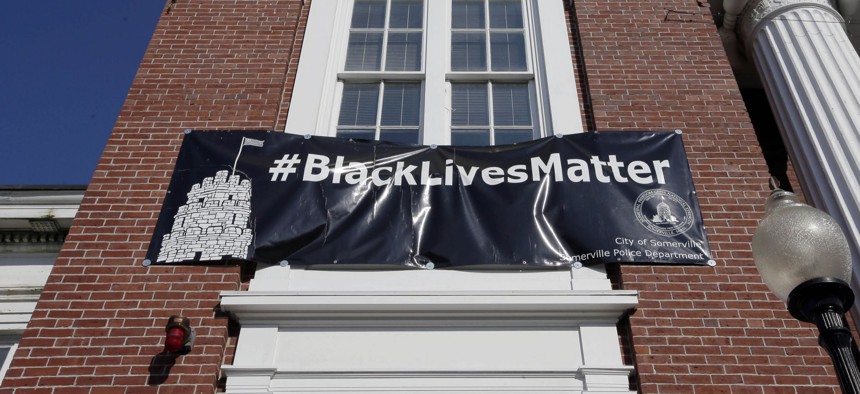Mayor Refuses to Remove ‘Black Lives Matter’ Banner; Baltimore Minimum Wage Split

The Black Lives Matter banner at Somerville City Hall. Steven Senne / AP File Photo
Also in our State and Local Weekend News Digest: No THC in Colo. water supply; feds rebuff Arkansas TANF request; and advocating for mental health reform in Minnesota.
SOMERVILLE, MASSACHUSETTS
LAW ENFORCEMENT | The mayor of this Boston-area municipality is refusing to remove a “Black Lives Matter” banner hanging from City Hall following calls from the Somerville Police Employees Association to replace it with an “All Lives Matter” sign. “It is inconceivable to us as it is demoralizing that our city would propagate its support for this movement while standing silent over the seemingly daily protest assassinations of innocent police officers around the country,” the police union president wrote Mayor Joe Curtatone last week. But the mayor has been standing his ground. “My unwavering support for our police officers does not and cannot preempt our commitment addressing systemic racism in our nation,” Curtatone said in a statement. [WCVB-TV; The Root]
BALTIMORE, MARYLAND
MINIMUM WAGE | City Council President Jack Young won’t agree to increasing Baltimore’s minimum wage to $15 an hour, arguing local government and businesses can’t afford more than $11.50 an hour. The council is split, and he’s the deciding vote. Maryland’s mandated minimum wage is $8.75 an hour and will rise to $10.10 an hour by 2018. Baltimore’s Finance Department estimates raising the minimum wage to $15 an hour would cost the city $150 million over five years and push unemployment as high as 10.6 percent. [The Baltimore Sun]
HUGO, COLORADO
MARIJUANA | After initial water quality tests last week indicated that the water supply in this eastern Colorado town was contaminated with THC, the psychoactive compound in marijuana, subsequent tests from the Colorado Department of Investigation released Saturday found that the water isn’t contaminated with THC. A water advisory for Hugo was promptly lifted. While authorities were being extremely cautious, the reality is that it would be extremely difficult for a water supply to be contaminated with THC. “It would take more product than any of us could afford to contaminate a city water supply to the extent that people would suffer any effects,” according to Lincoln County health officer. [The Denver Post]
ST. PETER, MINNESOTA
MENTAL HEALTH | A group of mothers has been leading efforts to reform operations at the Minnesota Security Hospital, the largest state-run psychiatric facility in the state. It all started with Lynda Hansen, whose son was hospitalized at the facility, but was stymied by efforts to see her son by hospital administrators and staff. A family advisory council that formed two years ago has led to changes at the hospital aimed at making the facility more humane and improving its care. They’re now working with Gov. Mark Dayton and the hospital union to secure more state funding for the hospital. [Star Tribune]
LITTLE ROCK, ARKANSAS
WELFARE | The federal government rejected a state Department of Workforce Services request to restrict financial aid provided under the Temporary Assistance for Needy Families program. The welfare waiver would have restricted cash withdrawals from electronic benefit cards and limited purchases to “essentials”: food, clothes, housing, utilities, child care, transport and uninsured medical needs. "Congress was clear that TANF recipients should have adequate access to their cash assistance, and [the Office of Family Assistance] will not be granting waivers of these provisions," wrote Susan Golonka, U.S. Office of Family Assistance acting director. [ArkansasOnline]
BLOOMFIELD, NEW JERSEY
POLICE | The New Jersey State Association of Chiefs of Police assessors began evaluating the Bloomfield Police Department’s policies and operations Sunday, setting up a call-in line for public comment. Bloomfield’s department must meet 105 standards to receive three-year accreditation. "Accreditation results in greater accountability within the agency, reduced risk and liability exposure, stronger defense against civil lawsuits, increased community advocacy, and more confidence in the agency's ability to operate efficiently and respond to community needs," said Police Director Samuel DeMaio. [NorthJersey.com]





